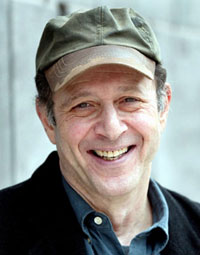
MusicX Bows Out -- for Now
Eighth blackbird clarinetist Michael Maccaferri ended Music08 with a soft, unresolved note Sunday afternoon in the Great Hall of Tangeman Center at the University of Cincinnati.

Fittingly so, perhaps, since the future of the College-Conservatory of Music's summer new music festival is seriously in doubt, having fallen to the budget ax last fall.
Still, Music08 went out on a high, with the Cincinnati premieres of Steve Reich's Double Sextet, co-commissioned for eighth blackbird by Music08, and "singing in the dead of night" by David Lang, Michael Gordon and Julie Wolfe of New York's Bang on a Can.
Anyone
who heard Reich's 1976 Music for 18 Instruments, Saturday night in
Corbett Auditorium heard Reich stretching the "Minimalist" tag on
Sunday.
Like his 2003 Cello Counterpoint, also heard
Saturday, Double Sextet is for simultaneous live and pre-recorded
performance. Eighth blackbird, a sextet of violin, cello, flute,
clarinet, piano and percussion, performed against a playback of
themselves. Also, the relentless, trance-like repetition of Reich's
earlier music has been supplanted by greater textual and textural
variety. Though piano and metallophone were a constant presence, you
could perceive a rough, three-part form.
Pianist Lisa Kaplan
took off with a be-bop flair after her recorded self, setting the
energetic work in rapid, ostinato motion. Succeeding this was a tender
violin melody (a touch of romance?) that got fragmented and traded
among the musicians. It was back to white-hot motion then, ending like
a slam against a wall. Reich, in his trademark cap, rushed to the
stage, where he hugged the players and acknowledged the crowd's ovation.
"Singing in the dead of night," separately commissioned for eighth
blackbird, recalled Stravinsky's "Soldier's Tale" in its
instrumentation and use of stage direction, here by Susan Marshall.
Though "singing" lacks a narrator or a plot as such, it's easy for the
listener to impose one, given its vague night time imagery. Three
movements by Lang, "these broken wings" one-three, alternated with one
each by Gordon and Wolfe. The "broken wings" prologue was high-lying
and shrill, with flutist Tim Munro on piccolo, Duvall on glockenspiel
and Nicholas Photinos underscoring the line with pizzicato.
Gordon's "the light of the dark" drew laughter as the players, Kaplan
on accordion, repeatedly interrupted Photinos' cello glissandi with a
bright major chord (as if telling him to stop), then adjourned to the
piano for a raucous jam session. Albert loaded Maccaferri with pieces
of metal, which slowly crashed to the ground. Things got morose in
"broken wings" two, where Kaplan and Photinos picked up the metal, only
to have Maccaferri deliberately drop it again.
In Wolfe's
"singing in the dead of night," a table (bed) was covered with bird
seed, which swished and spilled audibly to the floor as Kaplan and
Duvall tossed and turned on it. Each rose sleepless and there were some
chaotic-sounding "nightmares." You could hear the blustery "Winter" of
Vivaldi's "Four Seasons" and a chorale-like passage suspended as Kaplan
crawled back "in bed."
In "broken wings" three, Albert (viola),
Munro (piccolo) and Maccaferri (clarinet) repeatedly marched to the
front of the stage to make happy music against angry bass drum reports.
There was a poignant moment in which Albert played what sounded like a
quote from Arvo Pärt's anti-war "Cantus in Memory of Benjamin Britten."
A surprised looking Maccaferri was left alone, with a last whimper of clarinet.
(first published in The Cincinnati Enquirer June 23, 2008)